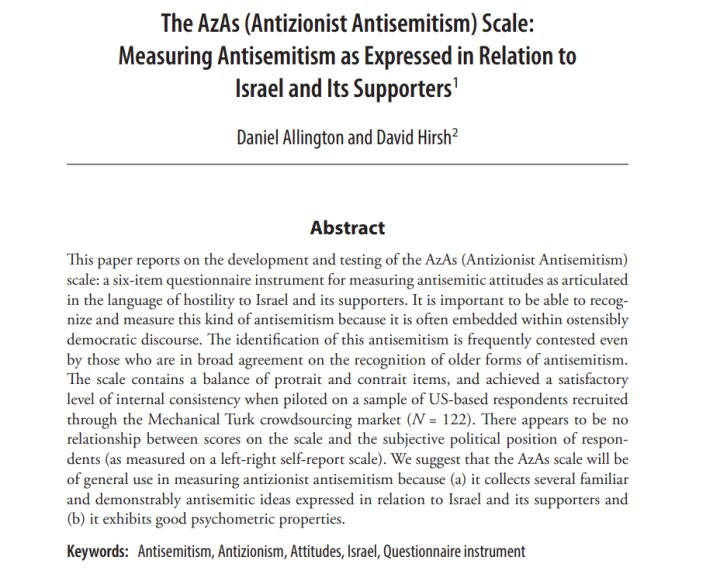The anti-Semitism Questionnaire: Find out if you're an anti-Semite
The Generalised Antisemitism (GeAs) Scale: A Questionnaire Instrument for Measuring Antisemitism as Expressed in Relation Both to Jews and to Israel
Respondents are not simply asked to agree or disagree to the Questionnaire statements. Respondents are offered an opportunity to grade their agreement or disagreement, such as, by indicating "somewhat agree," "strongly agree," "no opinion," "somewhat disagree," or "strongly disagree.
3.1. JpAs 1 “Jewish people can be trusted just
as much as other [nationality] people in
business”
3.2. JpAs 2 “Jewish people are just as loyal to
[nation] as other [nationality] people”
3.3. JpAs 3 “I am just as open to having Jewish
friends as I am to having friends from other
sections of [nationality] society”
3.4. JpAs 4 “Compared to other groups, Jewish
people have too much power in the media”
3.5. JpAs 5 “Jewish people talk about the
Holocaust just to further their political agenda”
3.6. JpAs 6 “Jewish people chase money more
than other people do”
3.7. AzAs 1 “I am comfortable spending time
with people who openly support Israel”
3.8 AzAs 2 “Israel has a right to exist as a
homeland for the Jewish people”
3.9. AzAs 3 “Israel is right to defend itself
against those who want to destroy it”
3.10. AzAs 4 “Israel and its supporters are a bad
influence on our democracy”
3.11. AzAs 5 “Israel can get away with anything
because its supporters control the media”
3.12. AzAs 6 “Israel treats the Palestinians like
the Nazis treated the Jews”
Respondents are not simply asked to agree or disagree to the Questionnaire statements. Respondents are offered an opportunity to grade their agreement or disagreement, such as, by indicating "somewhat agree," "strongly agree," "no opinion," "somewhat disagree," or "strongly disagree.
3.1. JpAs 1 “Jewish people can be trusted just
as much as other [nationality] people in
business”
3.2. JpAs 2 “Jewish people are just as loyal to
[nation] as other [nationality] people”
3.3. JpAs 3 “I am just as open to having Jewish
friends as I am to having friends from other
sections of [nationality] society”
3.4. JpAs 4 “Compared to other groups, Jewish
people have too much power in the media”
3.5. JpAs 5 “Jewish people talk about the
Holocaust just to further their political agenda”
3.6. JpAs 6 “Jewish people chase money more
than other people do”
3.7. AzAs 1 “I am comfortable spending time
with people who openly support Israel”
3.8 AzAs 2 “Israel has a right to exist as a
homeland for the Jewish people”
3.9. AzAs 3 “Israel is right to defend itself
against those who want to destroy it”
3.10. AzAs 4 “Israel and its supporters are a bad
influence on our democracy”
3.11. AzAs 5 “Israel can get away with anything
because its supporters control the media”
3.12. AzAs 6 “Israel treats the Palestinians like
the Nazis treated the Jews”





